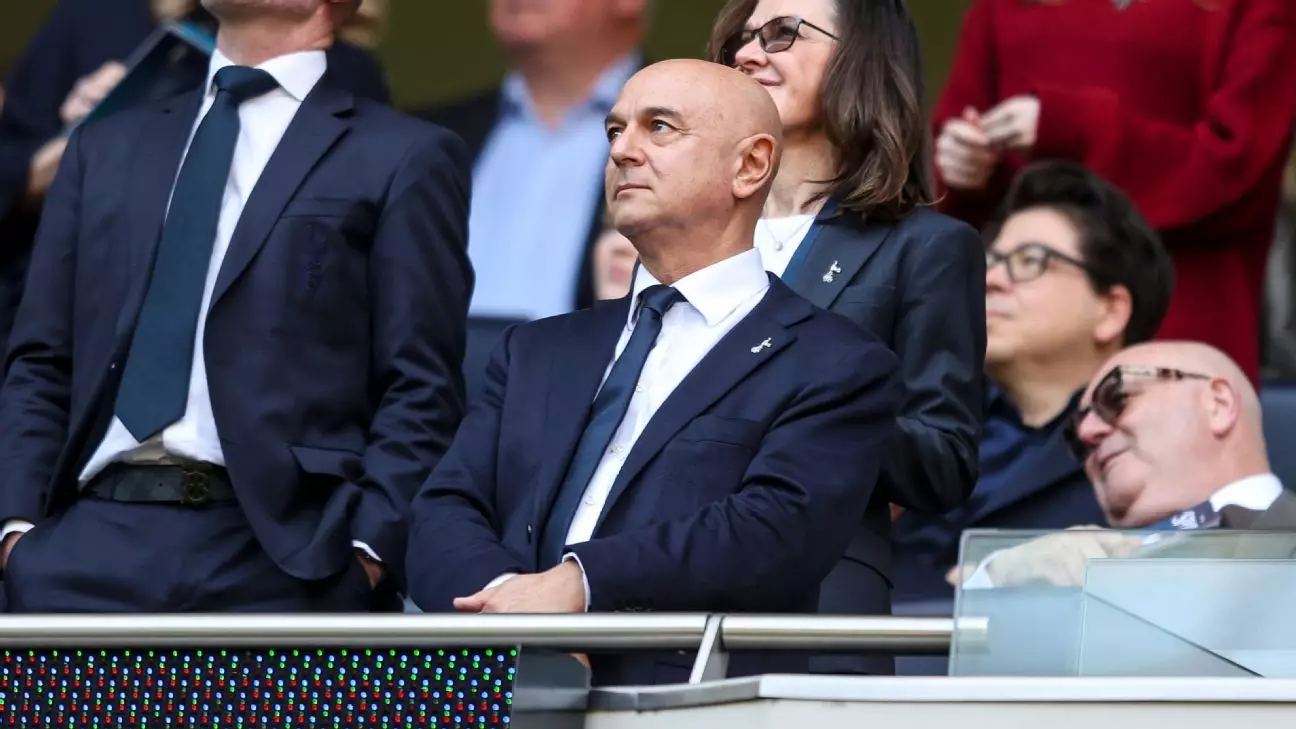Tottenham Hotspur’s chairman, Daniel Levy, is no stranger to the challenges of leading a football club mired in fan frustration and high expectations. His recent statements amid the club’s annual financial report reveal the landscape of discontent surrounding the Spurs’ transfer strategy. Despite being one of the wealthiest clubs globally—ranked ninth in financial prowess—Levy’s defense hinges on a narrative of sustainable growth and economic stability. His emphasis on prudent financial management clashes with the impatient desire of supporters who see investment in top-tier talent as essential for success. The dichotomy is palpable: on one hand, a club with significant financial capabilities; on the other, a disillusioned fanbase desperate for tangible success on the pitch.
Levy finds himself at the intersection of financial responsibility and the relentless pursuit of glory. It’s a position that straddles the complexities of modern football, where substantial investments don’t always guarantee immediate results. Much of the criticism leveled at him stems from the perception that fellow competitors are outspending Spurs with abandon, yet Levy insists that long-term viability trumps short-term extravagance. However, this stagnation in strategic spending raises deeper questions about the club’s vision and its ability to attract top talent over the competition.
The Shadow of Underachievement
The current season has been a grim affair for Spurs, as they languish in a disappointing 14th place in the Premier League. This lackluster performance not only jeopardizes their standing in English football but also amplifies the pressure on Levy and the management team. A 17-year trophy drought looms ominously, with the Europa League serving as arguably the club’s last beacon of hope for silverware. As Levy noted, the quarterfinals could provide a pathway to the prestigious UEFA Champions League, yet the significance of this tournament contrasts sharply with the barren reality of league performance.
The sense of urgency is palpable among supporters, highlighted by protests against Levy before key matches. Such dissent showcases the deep-seated frustration filling the hearts of Spurs fans who watch rival clubs continuously enhance their squads while their own club struggles for consistency and creativity on the field. The apparent paradox has transformed into a tangible sense of desperation, further complicating Levy’s position as chairman. The delicate balance between the expectations of passionate supporters and the impending need for financial prudence must be recalibrated urgently.
A Season of Transition and Turmoil
Tottenham’s path to revitalization took a challenging turn with the loss of star player Harry Kane, who moved to Bayern Munich amid a rebuilding phase; yet, Levy highlighted the nearly £700 million investment in new signings since the unveiling of their state-of-the-art stadium. This portfolio includes a fresh wave of talent brought in to spark new life into the squad, yet results have been mixed at best. The revolving door of player transfers is intended to usher in success, but transformative change demands not just investment but also effective strategy and integration into the gameplay.
Ange Postecoglou’s first season as head coach showcased potential as Spurs managed to secure fifth place last term, leading to Europa League qualification. However, the current season tells a different tale. Plagued by injuries and inconsistencies, the team’s hopes hinge precariously on a single competition rather than the league. As they gear up to face Eintracht Frankfurt in the Europa League, the scrutiny on training, tactical competence, and player morale intensifies.
The women’s team, too, is navigating troubled waters, struggling for form and consistency in the Women’s Super League. Speculations surrounding head coach Robert Vilahamn add another layer of complexity. The performance of both teams echoes a broad thematic concern confronting Tottenham Hotspur: progress seems evanescent, overshadowed by a need for immediate success.
Shifting the Narrative: Hope Amid Crisis
Amid the chaos and contention, there remains a sliver of hope. Levy’s recognition of the club’s challenges in the latest financial report is one step toward accountability, albeit a cautious one. The acknowledgment of the need for smart spending within the framework of their financial capabilities suggests a forward-thinking approach. For dedicated supporters, transparency could serve as a crucial balm for growing frustrations.
However, Levy must back these statements with decisive actions that align vision and execution. Renewed investment strategies in player recruitment, paired with a commitment to nurturing talent and implementing dynamic tactics, might ignite a transformative phase for Tottenham Hotspur. The club’s ambitions fuel the desire for exaltation, yet it must navigate through these tumultuous times with intention and foresight if they are to reclaim their status as a power in English football.

